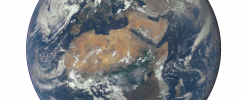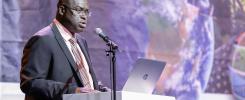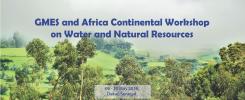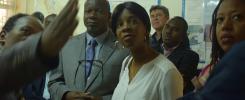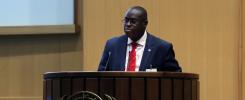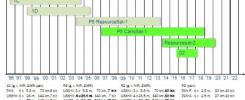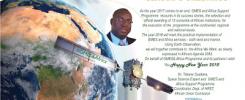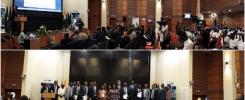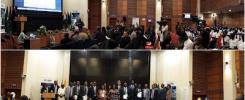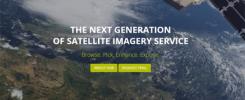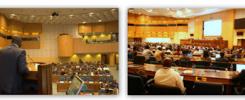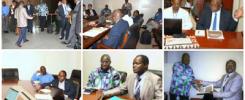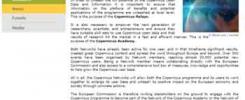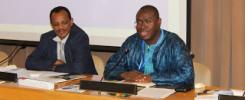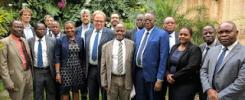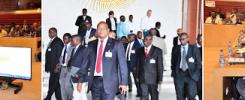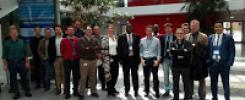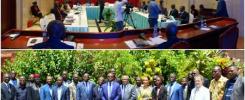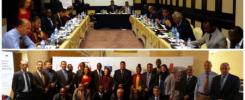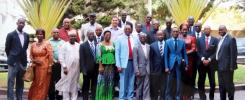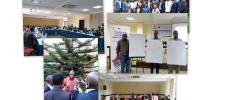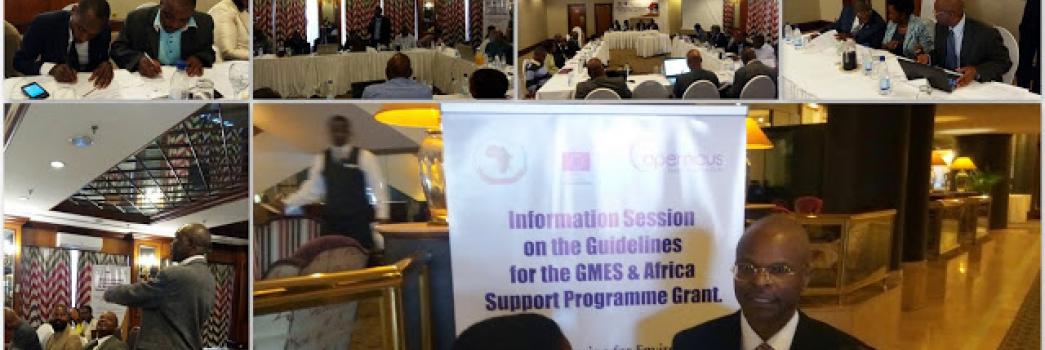
3rd GMES & Africa Grants Information Meeting - Southern Africa Region, Harare-Zimbabwe, 15-16 Mar. 2017
16 March 2017
The GMES & Africa Programme, organized the third information session with potential applicants for its grants in the South Africa region from the 15th to the 16th of March 2017, at the Hotel Meikles. in Harare, Zimbabwe.
The session provided the opportunity to expose the participants to critical information on the Guidelines on the Call for Proposals with a view to ensuring that the institutions are adequately aware of the procedures for application. It was also an avenue to launch a robust media and publicity campaign for GMES & Africa, with cross-cutting press coverage, interviews and publication.
The Director of Research and Technology at the Zimbabwean Ministry of Tertiary and Higher Education commended the open call for consortia approach - as opposed to the focus on individual institutions; as well as the active involvement of renowned academic institutions.
Contacts details
The session provided the opportunity to expose the participants to critical information on the Guidelines on the Call for Proposals with a view to ensuring that the institutions are adequately aware of the procedures for application. It was also an avenue to launch a robust media and publicity campaign for GMES & Africa, with cross-cutting press coverage, interviews and publication.
OPENING STATEMENTS
SADC
Dr. Bradwell Garanganga of SADC noted that GMES & Africa will contribute to the well-being of people in the region by helping to reduce the negative impacts of climate induced hazards such as droughts, floods and wildfires. It will also contribute to better environmental and agricultural management through evidence based decision-making.
The SADC Secretariat is fully committed to supporting the implementation of GMES & Africa. This he said, is demonstrated by the existence and activities of the SADC Climate Service Centre which is to ensure sustainable access to earth observations in the region.
SADC emphasized the importance of having a spectrum of experts discussing the issue of Earth Observation for the user communities to benefit, noting that the region faces extreme environmental conditions. EO is a key and regular contributor to Early Warning Services that can help to prevent hazards developing into disasters.
The training will go a long way to ensuring SADC member states are better equipped to deal with environmental challenges such as floods, drought and related challenges. SADC is grateful to the European Union for the generous support towards the implementation of GMES & Africa.
GMES & Africa Coordinator
The GMES & Africa Coordinator gave a background to the African Space Policy and Strategy which forms the policy foundation of GMES & Africa.
He summarized thematic focus areas of the African Space Strategy as earth observation, navigation and positioning, satellite communications, and space science and astronomy. It was a directive of African leaders that the AUC ensures the continent’s full participation in space activities.
It is the wish of the AUC to see all the participants engaged in and committed to the discussions so as to equip them better in developing successful applications for the Grant.
Director of Research and Technology, Zimbabwean Ministry of Tertiary and Higher Education
The Director of Research and Technology at the Zimbabwean Ministry of Tertiary and Higher Education commended the open call for consortia approach - as opposed to the focus on individual institutions; as well as the active involvement of renowned academic institutions.
For the region, the meeting is important in the following ways:
- It will make prospective institutions fully aware of different steps and criteria stipulated in the guidelines so as to avoid mistakes and omissions that may lead to the rejection of their proposals;
- It will stimulate possibilities of institutions forming strong consortia in order to develop concrete proposals; and
- It will pave the way for the effective implementation of GMES & Africa in the continent.
She made reference to the Agenda 2063 which proposes stronger collaboration across Africa, for political and industrial reasons, economy of scale, sound utilization of resources and professional capacity within the regions. This is a kind of industrialization agenda for which skills development is needed. She encouraged the institutions to constitute strong consortia not only in the region but across Africa.
PRESENTATION by SADC
The presentation introduced the SADC Meteorological Sector and the SADC Climate Service Centre (CSC), an institution of the Southern African Development Community. The presenter noted that ICT, Energy and Water are critical domains in the region, and that the architecture of the infrastructures and services of the CSC reflects these concerns. Meteorology is very critical for agriculture, hydropower and solar energy, which need a good understanding of the climate system, especially when droughts and floods can happen simultaneously, like it is presently the case in the IGAD and SADC regions. The use of EO is therefore important in addressing both at the same time on a real-time basis, thereby contributing to alleviate disasters.
The presentation delved into regional approaches in mitigating adverse climate impacts to contribute to socio economic development, including data processing and archiving techniques development, the generation and dissemination of environment monitoring products, capacity building activities, as well as synergies with other organizations to strengthen links with users from various sectors.
On the question of gaps in information which is not reported locally, SADC maintained that the national services need a more holistic and stronger approach in exchanging information and ideas.
PRESENTATION ON GMES & AFRICA STATE OF PLAY
The GMES & Africa Coordinator presented the project’s generic status; its historical background in the context of EU-Africa cooperation in space; the thematic areas, plan of action, funding, as well as the 23 applications under the 2 services and their geographic distribution. He further detailed the governance structure of the project and its framework for capacity development and utilization.
Participants raised questions on the Departments at the forefront of the Grants; composition of the consortia; whether there have similar initiatives elsewhere, if there can be partnerships extending beyond borders; and the prospects of GMES & Africa offering scholarship opportunities for students.
In response, the AUC side maintained that for years, the Meteorological Departments have been the entry key to EO Projects. The change with GMES & Africa is that Met. Departments are now going to contribute with data, provide insights and modelling in projects led by other players.
Consortia should be based on the applications and tools identified for the regions, but the principle is interregional collaboration, where regions can adapt what has already worked in other regions. The underlining motivation for partnerships is complementarity and effectiveness. Similar initiatives exist in Europe, South America and Asia, but the data and mechanisms of the programmes differ. The lessons learned show, notably, that the beneficiaries must guide the implementation, and that the overlaps are reduced when the partners strategize upstream. GMES & Africa is not a research and development programme but encourages the use of Copernicus data, as an achievement of a unique long-term collaboration between the AU and EU.
PRESENTATION ON THE AFRICAN UNION'S PROCUREMENT PROCEDURES
The Procurement Officer from the African Union presented the Commission’s procurement procedures, explaining the background and Legal Framework; principles surrounding procurement; internal procurement arrangements; assurance and compliance; procurement by grant recipients; as well as the ethics, responsibilities and obligations of the AUC, its departments and officials.
Questions were raised from among the participants on the prospects of technical assistance for applicants for the Grant who want to engage consultants; whether there is a requirement for applicants to submit a letter of support from their governments; the nature of core financing which touches on the issue of ownership; the 90 day duration of the Call which may be challenging for some of the institutions who need to work in partnership; the participation of countries under sanction by the AU; and the mode and channels of submitting applications.
In response, the AUC team responded as follows:
That there is a methodology for recruitment under approved actions, but that the cost of the technical assistance must be in the budget. All requirements for applicants will be stated in the guidelines for applications that will be published together with the call for proposals. Applicants scores are connected to the level of co-financing, from 0 to 20%., and the more the co-financing within this range, the more marks for the applicant up to a ceiling of 5 additional marks. There must be a timeline for the whole process and when the call is launched, the participants have 90 days to submit their applications, however, potential applicants would have been adequately prepared to start the process even before the Call is launched. GMES will thread on both the need to observe AU rules, as well as the need to be inclusive in the spirit of the pan African programme that is funding the initiative.
PRESENTATION ON THE GUIDELINES
The GMES & Africa Coordinator presented the Guidelines on the Call for Proposals, and he began with the general, then specific objectives of the Call. On the Guidelines, he said the objective is to provide applicants with relevant information on the GMES & Africa Support Programme, on the priority areas for the Call for Proposals and the expected results/outcomes. The Guidelines will also guide applicants through the rules and the application process to submit their proposals, and provide them with information on the proposals' evaluation process and grid for transparency and guidance. The Guidelines will further inform applicants on how the results will be communicated and published. The presentation again highlighted the priority areas of the Grants, which will be issued in two lots according to the 2 services: Water & Natural Resources, and Marine and Coastal Areas.
On financial allocations for the Grants which amounts to 17, 500, 000 Euro, the GMES & Africa Coordinator underscored the financial obligations of the contracting authority (AUC), the applicants and their partners, as well as the manner in which the Grants will be issued. He emphasized the rules for the Call for Proposals, including the eligibility of applicants, eligible actions, costs, and procedures to follow in applying.
In the ensuing discussion, participants stated that some issues which are crosscutting in the region have been well developed in other regions. Therefore, they can be adapted, notably, land degradation. However, communication between the member states is key, but limited by bureaucracy and, ultimately, remaining a challenge. With varying levels of information sharing in the different countries, participants suggested first to harmonize procedures at national level before upgrading to the regional level.
On the question of what will happen if the projects are not closed at the end of the planned period, the AUC team informed participants that there will be no cost extension. On the involvement of the private sector, participants were reminded that discussions were held extensively throughout Africa to find the correct configuration, knowing that the spirit of the grant is not to make profit. The private sector is not part of the consortium as the money is for the applicants only.
CONCLUSIONS AND RECOMMENDATIONS
The session ended with a consultative brainstorming among participants on how to approach the formation of consortia within the region as a strategy to maximize their chances at succeeding in accessing the Grants. Participants discussed the region’s invariable strengths, opportunities and priorities before identifying the following potential areas for the consortia:
ATTENDANCE
The session drew participants from the AUC Departments of Human Resources, Science and Technology, Rural Economy and Agriculture, Administration and Human Resource Management, the Southern African Development Community (SADC), the Zimbabwean Ministry of Higher and Tertiary Education, the Meteorology Department of Zimbabwe, and EO-based institutions in Southern Africa, as well as local media houses.
- Shawa Patrick, WECS 2, pshawa@gmail.com
- TAPELA Mataba, BUAN, mataba.tapela@gmail.com
- Shiba Sipho Simeon, Min. of Agric., Zimbabwe,sthokozane@yahoo.co.uk
- Mashame Gofamodimo, DSM, Botswana,GMASHAME@GMAIL.COM
- Kupunda Gilbert Cathy Ahmos, DLRC, gkupunda@gmail.com
- Tidiane Ouattara, AU Commission, Ouattarat@africa-union.org
- Tefsehit Beyene, AU Commission, Tefsehitb@africa-union.org
- Fatty Adiatou, AU Commission, fattya@africa-union.org
- Norman Mushabe, AU Commission, mushaben@africa-union.org
- Saley Bachir Mahaman, AU Commission, bachirs@africa-union.org
- Brice Montfraix, AU Commission, BM@PLURIVALENT.COM
- Aleck Munhamo, AU Commission, munhamoa@africa-union.org
- Charles Paradzayi, MSU, cparadzayi@gmail.com
- Tamburino Pasipangidiya, MSD, tambupasi@yahoo.com
- B. Murwira, MSD, blessedmurwira@gmail.com
- Chanty Dene, MSD, chantydenheraet@gmail.com
- Munashe Mushabatu, MSD, mashabatum@gmail.com
- Patience Chiramba,MSD, patiechiramba@gmail.com
- R. Karimanzira, H&T Edu. Min., Zimbabwe,
- Godfrey Pacharo,SIRDC,gpacharo@sirdc.ac.zw
- N.G Dupwa, MSTD, ngdupwa@gmail.com
- P. Mazhara,Met. Dept., Zimbabwe, pmazhara@yahoo.com
- R. Manzou,Met. Dept., Zimbabwe, Manzou.becky@gmail.com
- T. Makandisa, H&T Min. of Zimbabawe, tmakandisa@yahoo.com
- Bradwell Garanganga, SADC, bjgaranganga@gmai.com
LINKS
Contacts details
- Dr. Bradwell GARANGARA, SADC-Climate Service Centre Coordinator, SADC House, Gaborone-Botswana, http://www.sadc.int/sadc-secretariat/services-centres/climate-services-centre/ Email: bgaranganga@sadc.int
- Mrs. R.P. KARIMANZIRA, Director of Research and Technology, Ministry of Higher and Tertiary Education, Science and Technology Development. Email: rungano.pu@gmail.com
- Dr. Tidiane OUATTARA, GMES & Africa Programme Coordinator, Dept. of Human Resources, Science and Technology (HRST), African Union Commission, Addis Ababa – Ethiopia. Email: OuattaraT@africa-union.org
- Mr. Adiatou FATTY, GMES & Africa Communication Officer, Dept. of Human Resources, Science and Technology (HRST), African Union Commission, Addis Ababa – Ethiopia. Email: ardyfatty@yahoo.co.uk
- Prof. Mahama Bachir SALEY, GMES & Africa Water and Natural Resources Senior Expert, Dept. of Human Resources, Science and Technology (HRST), African Union Commission, Addis Ababa – Ethiopia. Email: basaley@yahoo.fr
- Mr. Brice MONTFRAIX, GMES & Africa Technical Assistance Team, Dept. of Human Resources, Science and Technology (HRST), African Union Commission, Addis Ababa – Ethiopia. Email: bm@plurivalent.com
On the net
- Africa, Europe collaborate in space science and technology, By Byron Adonis Mutingwende, Editor, Spiked Zimbabwe Online, http://www.spiked.co.zw
- Africa receives EU grant for earth observation
Other resources
- Concept note on GMES & Africa;
- Programme of the Grant Information Meeting Harare;
- Media Advisory on GMES & Africa;
- Speech by Mrs. R.P. KARIMANZIRA, Director of Research and Technology of Zimbabwe;
- Speech by Dr Bradwell GARANGANGA; SADC-CSC Coordinator;
- Speech by Dr Tidiane OUATTARA, G&A Programme Coordinator;
- The SADC Climate Services Programme;
- Presentation of GMES and Africa;
- Presentation of the GMES and Africa Guidelines;
- Presentation of the AUC Procurement Procedures;
- Presentation of the AUC Grants Management.




